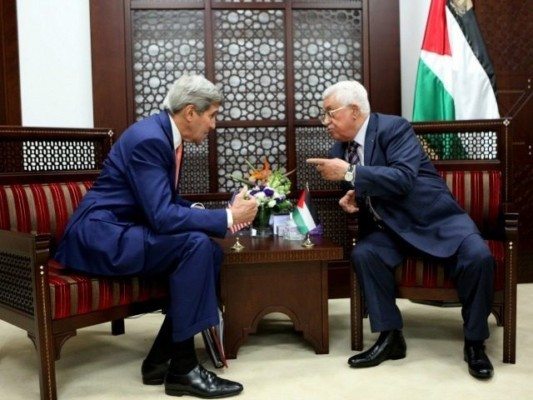
An Egyptian paper published what it claims are the transcripts of meetings between top US and Palestinian officials that, if true, would corroborate Israeli accusations that the Obama administration was behind last week’s UN Security Council resolution condemning Israeli settlements.
At the same time, a report in an Israeli daily Tuesday night pointed to Britain helping draft the resolution and high drama in the hours leading up to the vote, as Jerusalem tried to convince New Zealand to bury the Security Council measure.
Also present at the meeting were US National Security Adviser Susan Rice, and Majed Faraj, director of the Palestinian Authority’s General Intelligence Service.

US National Security Adviser Susan Rice speaks during the American Israel Public Affairs Committee 2015 Policy Conference, March 2, 2015 in Washington, DC. (photo credit: Mark Wilson/Getty Images/AFP)
Kerry is quoted as saying that he could present his ideas for a final status solution if the Palestinians pledge they will support the proposed framework. The US officials advised the Palestinians to travel to Riyadh to present the plan to Saudi leaders.
Israel fears that Kerry, who is slated to give a speech Wednesday on the subject, will then lay out his comprehensive vision for two-state solution at a Paris peace conference planned for January. Israel has refused to attend. Israel further fears that this Kerry framework could be enshrined in another UN Security Council resolution.
The Egyptian report fits with Israeli claims that it had received “ironclad” information from Arab sources that Washington actively helped craft last week’s UN resolution declaring Israeli settlements illegal.
“We have ironclad information that emanates from sources in the Arab world and that shows the Obama administration helped craft this resolution and pushed hard for its eventual passage,” said David Keyes, spokesman for Prime Minister Benjamin Netanyahu.
The Egyptian report did not detail whose transcripts of the meeting it had obtained or how it had obtained them.
Responding to a question about the Al-Youm Al-Sabea report, State Department Spokesman Mark Toner denied that the US discussed the language of the resolution with Erekat or in a meeting with officials from New Zealand.
The Obama administration has denied it was behind the resolution, saying that it only decided not to veto it after reading the final text.
Meanwhile, a report in the daily Haaretz Tuesday cited Western and Israeli officials detailing how Britain, and not the US, worked with the Palestinians to craft the text of the resolution, toning it down to make it palatable enough for Washington to avoid a veto.
“The Israeli diplomats say that from information that reached the Foreign Ministry in Jerusalem, British legal figures and diplomats had been working directly with the Palestinians on the wording of the resolution even before it was distributed by Egypt,” Haaretz said.
According to Haaretz, in the hours before the resolution went forward, Netanyahu phoned New Zealand Foreign Minister Murray McCully, and warned him that going ahead with the resolution “will be a declaration of war.”
“It will rupture the relations and there will be consequences. We’ll recall our ambassador to Jerusalem,” Netanyahu is reported to have said.
Since the resolution passed, Netanyahu has taken a series of measures against the states that supported the resolutions, minimizing ties with some and calling in their envoys for rebuke.
According to the Egyptian report, the US diplomats expressed their mistrust of Netanyahu, saying he wanted to destroy the two-state solution and was only interested in maintaining the status quo between Israel and the Palestinians.
The transcript showed Kerry and Rice advising the Palestinians not to make any provocative moves when US President-elect Donald Trump takes office on January 20, calling him dangerous.
They warned against such steps as ending security cooperation with Israel, pursuing legal action against Israeli officials in the ICC, or dissolving the Palestinian Authority.
They also said Trump’s administration was likely to adopt a policy on the Israel-Palestinian conflict that would be totally different to that of previous administrations going back to 1967.
In this Friday, Dec. 11, 2015 file photo, Palestinian chief negotiator Saeb Erekat delivers a speech at the Mediterranean Dialogues Conference Forum, in Rome. (AP Photo/Andrew Medichini, File)
When asked how the Palestinians would react if Trump carried out his promise to move the US embassy to Jerusalem, Erekat reportedly said the Palestine Liberation Organization would rescind its recognition of Israel and ask Arab states to expel their US envoys.
Erekat made precisely that threat in a December 19 conference call organized by the Wilson Center policy forum. He said he would immediately resign as the chief Palestinian negotiator, and that “the PLO will revoke its recognition of Israel” as well as all previously signed agreements with Israel. Furthermore, said Erekat, all American embassies in the Arab world would be forced to close — not necessarily because Arab leaderships would want to close them, but because the infuriated public in the Arab world would not “allow” for the embassies to continue to operate.
The Associated Press contributed to this report.



